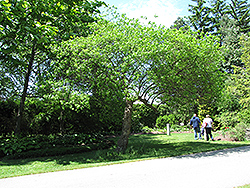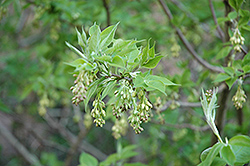It's all about ...
plants

Height: 15 feet
Spread: 15 feet
Sunlight:
![]()
![]()
![]()
Hardiness Zone: 3b
Other Names: Wafer Ash, Water Ash
Description:
An uncommon shrub, wide spreading and low growing, often suckering; grown for interesting green hop-like fruits in summer, performs well in shade, a good background plant that will reward the curious
Ornamental Features
Hop Tree has dark green deciduous foliage on a plant with a round habit of growth. The glossy compound leaves turn yellow in fall. It produces small clusters of green hop-like fruit from late summer to early fall. The warty gray bark adds an interesting dimension to the landscape.
Landscape Attributes
Hop Tree is a multi-stemmed deciduous shrub with a more or less rounded form. Its average texture blends into the landscape, but can be balanced by one or two finer or coarser trees or shrubs for an effective composition.
This is a relatively low maintenance shrub, and is best pruned in late winter once the threat of extreme cold has passed. Gardeners should be aware of the following characteristic(s) that may warrant special consideration;
- Suckering
Hop Tree is recommended for the following landscape applications;
- Mass Planting
- General Garden Use
Planting & Growing
Hop Tree will grow to be about 15 feet tall at maturity, with a spread of 15 feet. It tends to be a little leggy, with a typical clearance of 1 foot from the ground, and is suitable for planting under power lines. It grows at a slow rate, and under ideal conditions can be expected to live for 40 years or more.
This shrub performs well in both full sun and full shade. It is very adaptable to both dry and moist locations, and should do just fine under average home landscape conditions. It is not particular as to soil type or pH. It is somewhat tolerant of urban pollution. This species is native to parts of North America.
This plant is not reliably hardy in our region, and certain restrictions may apply; contact the store for more information.

